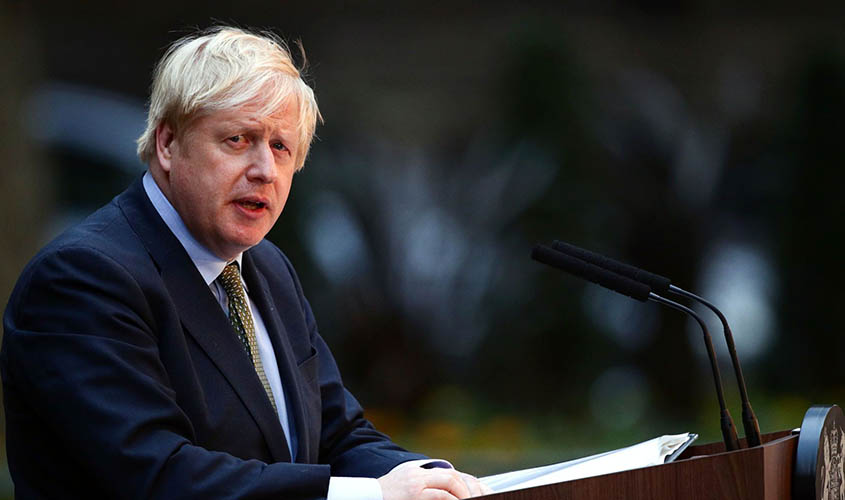As Covid infections rise again and as Tiers1-2-3 unpopularity increases the Boris Johnson government face unprecedented criticism, from within and without.
Lord Jonathan Sumption, former Supreme Court Justice and historian, has been publicly critical of the government’s Covid-19 restrictions and policies since March. On Wednesday Lord Sumption delivered the Cambridge Freshfields Annual Law Lecture, he begins “During the Covid-19 pandemic, the British state has exercised coercive powers over its citizens on a scale never previously attempted.” Sumption claims the government have deliberately avoided parliamentary scrutiny of their intentions by bypassing the elected representatives (MPs). Sumption says the government encouraged panic and this gave them a mandate for a coercive response, the Coronavirus Act (the emergency powers act discussed here: www.sundayguardianlive.com/world/wuhan-london-flights-continued-long) which smuggled in powers to spend, spend, spend with authoritative powers to control the movement of infectious people. Sumption explains the authority to confine healthy people is already conferred by the Civil Contigencies Act 2004, and Part IIA of the Public Health (Control of Disease) Act 1984, as amended in 2008. He details why the Prime Minister’s and the Health Secretary’s instruction and rules are purposefully misleading and a departure from constitutional principle https://resources.law.cam.ac.uk/privatelaw/Freshfields_Lecture_2020_Government_by_Decree.pdf
Sumption argues against the powers that curtailed dental, cancer and other services, plus the remarkable discretionary powers of enforcement conferred on and exceeded by the police. And he reminds the audience “When societies lose their liberty, it is not usually because some despot has crushed it under his boot. It is because people voluntarily surrendered their liberty out of fear of some external threat.” Sumption illustrates how the government has surreptitiously introduced ruling by decree and the dangers for civil liberties therein. Suella Braverman, UK Attorney General, has yet to issue a response.
A treble challenge for the cabinet has arisen from Conservatives, first from Sir Bernard Jenkin in an article in The Telegraph. Jenkin, Chair of the influential Liaison Committee, drew attention to the lack of co-ordination between government silos involved in the Test and Trace (T&T) project; he said “There is a spaghetti of command and control at the top, which is incapable of coherent analysis, assessment, planning and delivery”. Jenkin suggested Dido Harding, the head of NHS T&T, should be replaced and effective leadership be established to restore public confidence and compliance. The second challenge comes from Graham Brady, Chair of the 1922 Committee, where Conservative backbenchers air their approval or disapproval of government policy and practice. Brady wrote in Conservative Home that essential operations, mental health and domestic violence are being overlooked because of the excessive focus on Covid, he wrote “Journalists and campaigners have done good work highlighting these issues. But they are not being properly accounted for by policymakers. We have plenty of official statistics about the direct impact of Covid-19 (even if they are sometimes badly wrong). But precious few on the costs of fighting it.” Brady pleads for better data, empirical evidence and accountability in decision making. The third challenge comes from 50 mostly Conservative Members of Parliament who have grouped together as the Northern Research Group, as a result of a collective feeling that the government are not delivering their promise of “levelling up” for constituencies in the North of England, Wales and the Scottish Borders. The NRG feel the government’s newly found majority seats in the North will vanish if a Northern Economic Recovery Plan is not prepared by the Chancellor and a roadmap out of the Tier system to open up local economies is not clear.
Dr Raghib Ali, Senior Clinical Research Associate, MRC Epidemiology Unit, University of Cambridge and Consultant Physician in Acute Medicine, Oxford University Hospitals NHS Trust, has been examining a plan B to avoid the harms of another lockdown. Ali is not against an effective T&T system or Tiered restrictions but cites the problem of compliance. To get through the Covid winter Ali considers an adaptation of the Swedish system might be worthwhile, but with better protection of the vulnerable. Sweden has a permit system for events of 50 people, and tests for travellers, Ali recommends doctors, scientists, and politicians to get behind the same overall strategy, this will help recover public trust and aid compliance.
Which brings up the point these reports have raising over the past few months, government responses appear spontaneous and based on worst case modelling, it feels like the government have no predictive powers.
This lack of a grand strategy appears to manifest in public relations, foreign policy and domestic policy. Rishi Sunak and Priti Patel have been targeted by the opposition, Sunak for being successful and experienced, or in Patel’s case accusations of endangering the lives of legal professionals by her so called abusive talk. The Abraham Accord got noted but Pompeo’s visit and historic agreements between US-India were passed by, a trade deal with Japan was agreed and it is hoped India will be next. This week UK’s new Ambassador to China, Caroline Wilson, came out of quarantine in Beijing just as Priti Patel wants to introduce FBI style powers for the National Crime Agency to deal with agents from hostile states (Russia and China). The government seem preoccupied with Covid and NetZero emissions by 2050, as Rishi Sunak splashes money around supporting society the question on everyone lips is who is underwriting the borrowing?

